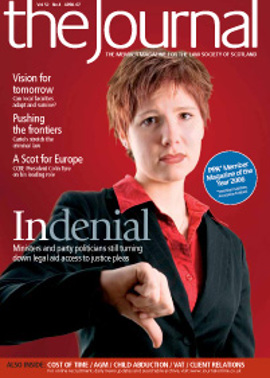Book reviews

BRIAN HARRIS QC AND ANDREW CARNES, BARRISTER
PUBLISHER: Jordans
ISBN: 1 84661 043 1
PRICE: £90
There are now a significant number of solicitors involved either in prosecuting professionals in disciplinary proceedings or defending them. The fourth edition of this book therefore appears at a very appropriate time although, as the authors themselves concede, its publication has come earlier than expected, mainly because of the number of important cases which have resulted not only from the Human Rights Act but also from challenges in relation to regulation and discipline under the Financial Services legislation and the new system in certain areas for healthcare regulation.
It is perhaps unfortunate that such a detailed book makes little or no reference to the Scottish position in relation to the regulation of solicitors, advocates or accountants, but the book is still a valuable tool for those looking at whether or not processes and procedures are fair and complaint with relevant legislation.
For those who do not have a great deal of experience of professional disciplinary or regulatory matters, chapter 3 is a very helpful guide to a common framework for dealing with professional discipline, setting out what might be expected of an investigatory body, an adjudicatory body and an appellate body. It is fair to say that many of the professions have slightly different approaches, but the principles set out in chapter 3 apply to most schemes.
The book also covers, helpfully, different types of professional misconduct and the role played by ethical guides and codes of practice or conduct.
It is also useful for those who may be invited to advise a body on setting up regulatory or disciplinary procedures, given that in chapters 6 to 9 it walks through how to take a complaint from its earliest roots through to prosecution before a disciplinary tribunal.
Some professions, of course, have separate, independent tribunals dealing with the final stage of regulation of professional discipline, and the book then goes on to deal with how those tribunals operate and the case law that continues to build. Importantly, a chapter is devoted to the issue of public hearings, including the problem of defamation that can arise and the duty of the tribunal to publish findings. As many solicitors involved in regulatory matters will know, the media are keen to publicise findings of disciplinary proceedings against professionals.
The field of regulation by the Financial Services Authority is a relatively recent growth area, and a chapter is devoted to the whole FSA regime and the approach taken in that. There is also, helpfully, information about the new regulatory setup which exists for some of the medical professions under the Council for Healthcare Regulatory Excellence.
The second part of the book may be particularly useful for those moving into the field of advice or prosecution of regulatory matters for the first time. Chapter 20 deals with the provision of practical advice both for those prosecuting in disciplinary procedures and for those defending.
Thereafter, in chapter 21, there is a very helpful breakdown of the professional disciplinary regimes on a number of different bodies, including the Architects Registration Board, the General Medical Council and the Royal College of Veterinary Surgeons. As mentioned earlier, however, Scottish professional bodies such as the Law Society of Scotland/Scottish Solicitors Discipline Tribunal and Institute of Chartered Accountants in Scotland are regrettably not included in this section.
The authors have also included a chapter which will be of assistance in relation to the Data Protection Act 1998, the Freedom of Information Act 2000 and the interaction of the two, an area where, clearly, there may be more legal challenges in the years ahead.
Finally, and importantly, the Appendix provides a detailed commentary on the Human Rights Act and its interpretation in disciplinary proceedings. This may be helpful for anyone considering whether a challenge under the Act in relevant proceedings is appropriate.
The overall impression is that a great amount of time and trouble has been taken to update this book. A fifth edition must be likely in the coming years given the continuing changes in professional discipline regulation.
In the meantime, despite the lack of information about Scotland, this book is an essential for those dealing in this area of law.
Philip Yelland, Director of Regulation, The Law Society of Scotland
In this issue
- The bigger picture
- Citizen justice
- Purely rhetoric?
- Purely rhetoric? (1)
- Profit, team by team
- Bring them home
- Bring them home (1)
- Local roots
- Wanted! (for conspiracy)
- One voice
- AGM report
- Dealing positively with client concerns
- Block fees: the story behind the changes
- Think before you charge
- For the high jump
- Jury questions
- Put to the test
- Yet another expense
- Planning with people
- Lifting the lid
- Website reviews
- Book reviews
- Home is where the heart is
- PSG - new certificate of title
- SEPA: apply online and save
- SEPA: apply online and save (1)






